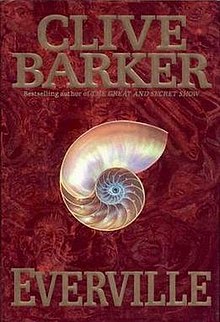 By CLIVE BARKER (Harper; 1994)
By CLIVE BARKER (Harper; 1994)
I know quite a few critics have proclaimed this sprawling epic, the middle portion of Clive Barker’s still-unfinished trilogy that began with THE GREAT AND SECRET SHOW, an imaginative masterpiece. I, on the other hand, find it a mess. A crisply written and uncommonly inventive mess, certainly, but a mess just the same.
Clive Barker’s preceding 1990s-era novels IMAGICA and THE THIEF OF ALWAYS saw him broadening his range (as did his subsequent novel, 1996’s SACRAMENT). For EVERVILLE, alas, Barker returned to his comfort zone in a dreary and overlong opus that adds nothing to this particular saga that THE GREAT AND SECRET SHOW didn’t already. Perhaps Barker was just tired out after the wondrous IMAGICA, which would explain why EVERVILLE’S Narnia-esque otherworldly setting, specifically the sea of Quiddity where people travel in their dreams, feels so scant and underdeveloped.
It seems the sea of Quiddity has become accessible by a rip in the fabric of reality, located atop a mountain overlooking the Oregon town of Everville. Such a concept would seem to promise all sorts of Barker-approved mayhem, as does a lengthy prologue set a century earlier that elaborates how Everville was founded amid a lot of strife and monsters. Ultimately, though, all that really happens is a town parade gets disrupted while several characters travel in and out of the rip battling each other, and a gang of ignorant rednecks straight out of CABAL/NIGHTBREED spring into action. As for the type of ingeniously developed story lines in which Barker usually specializes, you’ll find nothing of the sort in EVERVILLE’S staid and episodic narrative.
EVERVILLE’S biggest problem is simply that it contains too many characters. The surviving protagonists of THE GREAT AND SECRET SHOW all converge in Everville together with a new bunch of characters (many of them ghosts), making for a top-heavy cast, all of whom have various problems to work out. At the center of it all is Phoebe, a doctor’s assistant in love with Joe, a studly black painter, but they, like everyone else herein, don’t have enough time to fully register in a novel that’s at once perilously bloated and undernourished.
